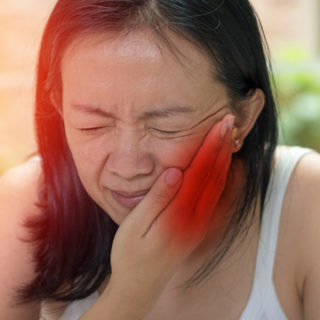 Serving Patients in the areas of Grand Rapids, Holland, and Big Rapids MI
Serving Patients in the areas of Grand Rapids, Holland, and Big Rapids MI
Temporomandibular joint disorder (also known as TMJ disorder or TMD) often causes its sufferers chronic, debilitating pain. However, did you know that a case of TMJ disorder also could cause a sleep breathing disorder like sleep apnea? Your TMJ doctors at TMJ & Sleep Disorders of Michigan want to use our knowledge to explain how sleep apnea—and other issues—can manifest from a case of TMJ disorder.
TMJ disorder is more common than you might think
According to statistics compiled by the National Institute of Dental and Craniofacial Research, TMJ disorder afflicts more than 10 million people in the United States. This ailment can affect anyone, although women are more susceptible than men. Common symptoms include jaw pain, hearing a popping or clicking sound when the jaws open and close, or limited range of motion in the jaws. Other potential symptoms include ringing in the ears and bite alignment problems.
How does TMJ disorder cause sleep breathing disorders?
One of the long-term consequences of living with untreated TMJ disorder is the misalignment of the bite and/or jaws. If your teeth are moved out of alignment, this alters the resting position of the tongue in the mouth, which can impede or totally block the airway when you sleep. When one of these blockages happens, the brain signals the body that the flow of air has been disrupted. You may not consciously wake up, but the sleep cycle is disrupted—depriving you of the quality restoration to mind and body that occurs during the deepest stage of the sleep cycle. For a person with a severe, undiagnosed, untreated case of sleep apnea, these episodes may take place hundreds of times each night.
TMJ and Headaches
One of the consequences of TMJ disorders is painful headaches that occur frequently and have an intensity similar to migraines. These headaches often may be diagnosed as migraines, but any medications for these migraines only manage the severity of the headaches themselves and do nothing to diminish how often the attacks happen. Perhaps you have been living with painful headaches and have yet to find relief. Maybe you have been diagnosed with migraines but find that nothing is working. If either of these situations sounds familiar, then you should be evaluated for TMJ disorder by an expertly trained neuromuscular dentist in Grand Rapids like the ones on staff at TMJ & Sleep Disorders of Michigan.
The link between TMJ disorder and painful headaches is more common than you might think. Recent research that was conducted at the University of Buffalo School of Dental Medicine studied 583 patients with frequent headaches and determined that 82 percent of females and 17 percent of males with those headaches also were suffering from symptoms associated with TMJ disorder.
TMJ relief in Grand Rapids
Our dentists, Dr. Jerry Mulder and Dr. Allyson Mulder, practice neuromuscular dentistry—a specialization of dental science that focuses on the alignment of the bite and jaw. Neuromuscular dentists have unique post-graduate training after dental school to identify and treat a case of TMJ disorder. If you are ready to find relief for your symptoms, contact our office today at (616) 458-0631 to schedule a consultation.
TMJ & Sleep Disorders of Michigan is here to serve patients in the areas of Grand Rapids, Holland, and Big Rapids in Michigan.